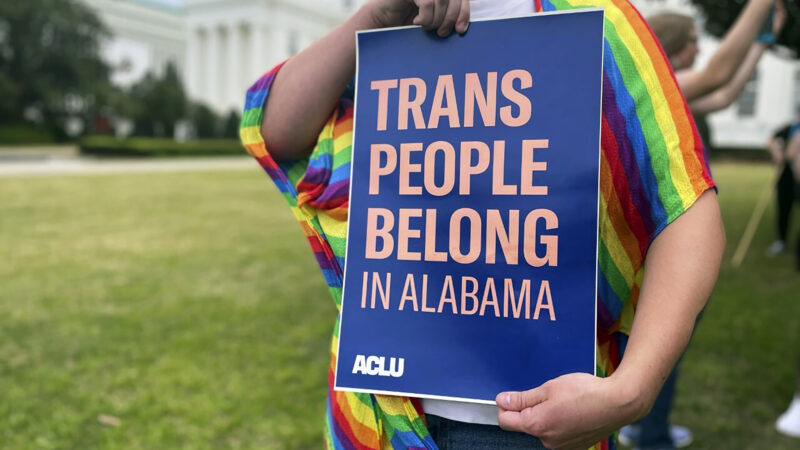Alabama can enforce a ban on gender-affirming care for transgender minors, appeals court rules
A person holds up a sign reading, "Trans People Belong in Alabama," during a rally outside the Alabama Statehouse in Montgomery, Ala., on International Transgender Day of Visibility, Friday, March 31, 2023. Alabama can begin immediately enforcing a ban outlawing the use of puberty blockers and hormones to treat transgender people under 19, a federal appeals court ruled Thursday, Jan. 11, 2024, granting the state’s request to stay a preliminary injunction that had blocked enforcement of the 2022 law.
MONTGOMERY, Ala. (AP) — Alabama can begin immediately enforcing a ban outlawing the use of puberty blockers and hormones to treat transgender people under 19, a federal appeals court ruled Thursday, granting the state’s request to stay a preliminary injunction that had blocked enforcement of the 2022 law.
The 11th U.S. Circuit Court of Appeals had previously ruled that the injunction should be vacated, but the decision had been effectively on hold for more than 18 months while families with transgender children asked the full appellate court to reconsider the decision. The Thursday order will allow the ban to take effect while the full court decides whether it will revisit the issue.
The state Attorney General Steve Marshall called the order a “significant victory for our country, for children and for common sense.”
“The physical and psychological safety of our children can now be better protected from these untested and life-altering chemical and surgical procedures through the implementation of the Alabama Vulnerable Child Compassion and Protection Act,” Marshall said.
Alabama Gov. Kay Ivey signed the Vulnerable Child Compassion and Protection Act into law in April 2022, making it a felony punishable by up to 10 years in prison for doctors to treat people under 19 with puberty blockers or hormones to help affirm their gender identity.
The ban was blocked less than a month later by a preliminary injunction ordered by U.S. District Judge Liles Burke, who ruled that Alabama had produced no credible evidence to show that transitioning medications are “experimental.” Alabama appealed the decision to the 11th Circuit.
At least 22 states have now enacted laws restricting or banning gender-affirming medical care for transgender minors, and many of them face lawsuits or blocked enforcement. Courts have issued mixed rulings, with the nation’s first law, in Arkansas, struck down by a federal judge who said the ban violated the due process rights of young transgender people and their families.
Lawyers representing parents of transgender adolescents who challenged the Alabama ban said the decision will “hurt parents and children in the state.”
“Today’s decision puts parents in the excruciating position of not being able to secure the medical treatment that their transgender adolescents need,” Jennifer L. Levi, an attorney with GLBTQ Advocates & Defenders, said. “It’s not the end of this effort to challenge that law, but it’s a really significant and disappointing setback.”
Parent Jeff Walker said he is reaching out to his 16-year-old transgender daughter’s medical provider to “figure out what can we do” to continue medications for her. State politicians, he said, are trying to override decisions made by parents and doctors.
“These same people that are wanting to restrict my daughter’s access to healthcare would be screaming that this is between a parent and their healthcare provider … if this was kids wearing masks because of a pandemic, if this was vaccinations,” Walker said.
He said the climate in the state and their community has gotten increasingly hostile to families with trans kids. After his daughter, Harleigh, was honored for her activism and appeared on a national talk show, he said another parent called to complain about the school not enforcing the state’s bathroom law. The school told Harleigh she could no longer use the girls’ bathrooms, he said. He said the “legislators are bullies” and the school system is “kowtowing to the bullying”
Dr. Morissa Ladinsky, a pediatrician who founded a Birmingham medical team that treats children with gender dysphoria, called the 11th Circuit decision “heartbreaking.”
“This is devastating for our patients and families,” Ladinsky said. “We will continue to provide all care we are legally able to. But the law taking effect does prevent us from providing medically necessary care.”
The lawsuit challenging the Alabama ban is scheduled to go to trial in August. The issue could ultimately be headed to the U.S. Supreme Court.
40 years after ‘Purple Rain,’ Prince’s band remembers how the movie came together
Before social media, the film Purple Rain gave audiences a peak into Prince’s musical life. Band members say the true genesis of the title song was much less combative than the version presented in the film.
Park Fire in California could continue growing exponentially, Cal Fire officer says
Cal Fire has confirmed that over a hundred structures have been damaged in the Park Fire, which grew overnight near Chico, Calif. Difficult firefighting conditions are forecast through Friday night.
Checking in with Black voters in Georgia about the election, now that Biden is out
Some voters who could be key to deciding who wins Georgia. What do they think about Vice President Harris becoming the frontrunner in the race to be the Democratic nominee?
Tahiti’s waves are a matter of ‘life and death’ for surfing Olympics
Tahiti's Teahupo'o wave has a slew of riders for the Paris 2024 Olympics. NPR finds out why it's called one of the most dangerous waves.
Researchers are revising botanical names to address troubling connotations
Since the mid-1700s, researchers have classified life with scientific names. But some of them have problematic histories and connotations. The botanical community is trying to tackle this issue.
A spectacular opening ceremony wowed a global audience despite Paris’ on-and-off rain
The Paris Olympics opening ceremony wowed Parisians, fans and most everyone who was able to catch a glimpse of thousands of athletes floating down the Seine to officially begin the Games.



